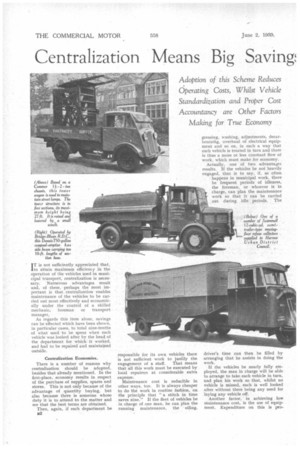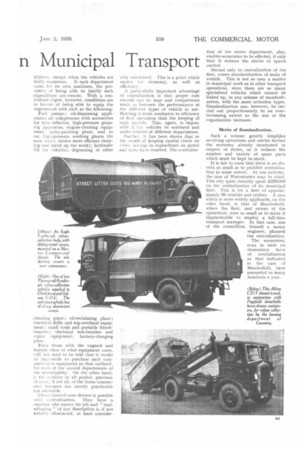Centralization Means Big Saving:
Page 36

Page 37

If you've noticed an error in this article please click here to report it so we can fix it.
n Municipal Transport Adoption of this Scheme Reduces Operating Costs, Whilst Vehicle Standardization and Proper Cost Accountancy are Other Factors
Making for True Economy
IT is not sufficiently appreciated that. Ito attain maximum efficiency in the operation of the vehicles used in municipal transport, centralization is necessary. Numerous advantages result and, of these, perhaps the most important is that centralization enables maintenance of the vehicles to be carried out most effectively and economically under the control of a skilled mechanic, foreman or transport manager, As regards this item alone, savings can be effected which have been shown, in particular cases, to total nine-tenths of what used to be spent when each vehicle was looked after by the head of the department for which it worked, and had to be repaired and maintained outside.
Centralization Economies.
There is a number of reasons why centralization should be adopted, besides that already mentioned. In the first-place, economy results in respect of the purchase of supplies, spares and stores. This is not only because of the advantage of quantity buying, but also because there is someone whose duty it is to attend to the matter and see that the best terms are obtained.
Then, again, if each department be D2 responsible for its own vehicles there is not sufficient work to justify the engagement of a staff. That means that all this work must be executed by local repairers at considerable extra expense.
Maintenance cost is reducible in other ways, too. It is always cheaper to do the work in routine fashion, on the principle that " a stitch in time saves nine." If the fleet of vehicles be in charge of one man, he can plan the running maintenance, the oiling,
greasing, washing, adjustments, decarbonizing, overhaul of electrical equipment and so on, in such a way that each vehicle is treated in turn and there is thus a more or less constant flow of work, which must make for economy.
Actually, one of two advantages results. If the vehicles be not heavily engaged, that is to say, if, as often happens in municipal work, there be frequent periods of idleness, the foreman, or whoever is in charge, can plan the maintenance work so that it can be carried out during idle periods. The
driver's time can then be filled by arranging that he assists in doing the If the vehicles be nearly fully employed, the man in charge will be able to arrange to take each vehicle in turn, and plan his work so that, whilst no vehicle is missed, each is well looked after without there being any need for laying any vehicle off.
Another factor, in achieving low maintenance cost, is the use of equipment. Expenditure on this is pro hibitive, except when the vehicles are fairly numerous. If each department cares for its own machines, the prospects of being able to justify such expenditure are remote. With a centralized depot, however, conditions are in favour of being able to equip the department with such as the following:
Fuel pumps ; oil-dispensing appliances; air compressors with accessories for tyre inflation, high-pressure greasing apparatus, engine-cleaning equipment, spray-painting plant, and so on; high-pressure washing plants (to save water, ensure more efficient cleaning and speed up tne work); hydraulic lift fur vehicles ; degreasing or other
cleaning plant ; oil-reclaiming plant ; electrical drills and top-overhaul equipment; small tools and portable &tees' benches: electrical test-benches and repair equipment ; battery-charging plant.
Even those with the vaguest and haziest ideas of what equipment costs, will not need to be told that it would be inipsssible to purchase such comprehensis-e equipment as that outlined, for each of the several departments of the municipality. On the other hand, it the vehicles be all pooled, purchase of mo.: if not all, of the items enumerated hecomes not merely practicable hut advisable.
Closer control over drivers is possible with centralization. They have a superior who knows his job and " leadsWinging " 'of any-descriptiOn is, if not entirely eliminated, at least consider
ably minimized. This is a point which makes for economy, as well as efficiency.
A particularly important advantage of centralization is that proper cost records can be kept and comparisons made as between the performances of the different types of vehicle in use. Nothing is more conducive to efficiency of fleet operation than the keeping of such records. This, again, is impossible if the vehicles be scattered and under control of different departments.
Further, it has been shown that as the result of keeping careful check on ,:•osts, savitigs in expenditure on petrol and tyres have resulted. The centraliza
tion of the stores department, also, enables economies to be effected, if only that it reduces the stocks of spares carried.
Second only to centralization of the fleet, comes standardisation of make of vehicle. This is not so easy a matter in municipal work as in other transport operations, since there are so many specialized vehicles which cannot be linked up, in any scheme of standardization, with the more orthodox types. Standardization can, however, be carried out proportionately to an everincreasing extent as the size of the organization increases.
Merits of Standardization.
Such a scheme greatly simplifies servicing operations and carries further the economy already mentioned in respect of stores, as it reduces the number and variety of spare parts which must be kept in-stock.
It is fair to state that there is no district so small as to prohibit centralization to some extent. At one extreme, the case of Westminster may he cited. This city quite recently spent R,250,000 on the centralization of its municipal fleet. This is for a fleet of approximately 80 vehicles and trailers. A case which is more widely applicable, on the other hand, is that of Macclesfield, where the, fleet, and extent of the operations, were so small as to make it impracticable to employ a full-time transport manager. In that case, one of the councillors, himself a motor engineer, planned the centralization.
The economies, even in such an elementary form of centralization as that indicated in the case of Macclesfield, have amounted to many hundreds a year.












































































